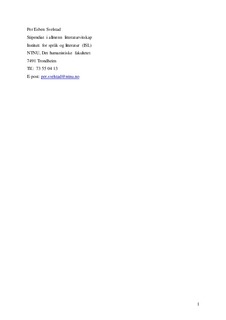| dc.contributor.author | Myren-Svelstad, Per Esben | |
| dc.date.accessioned | 2016-07-11T07:45:54Z | |
| dc.date.accessioned | 2016-07-19T11:18:03Z | |
| dc.date.available | 2016-07-11T07:45:54Z | |
| dc.date.available | 2016-07-19T11:18:03Z | |
| dc.date.issued | 2016 | |
| dc.identifier.citation | Tidsskrift for kjønnsforskning 2016, 40(1):45-61 | |
| dc.identifier.issn | 1891-1781 | |
| dc.identifier.uri | http://hdl.handle.net/11250/2396767 | |
| dc.description.abstract | The French poet Louise Labé (152?–1564) has been portrayed for the last century as an early feminist. But is Labé’s vision of a liberated future only relevant for those who possess the «commodity» of intellectual goods? This article’s reading of the dedicatory epistle in her unique collection of poetry argues that it may indeed be regarded as a «manifesto» anticipating modern feminism. I also suggest that the rhetorical argument of her text is connected on the one hand to changes in the status of women in sixteenth century France, and on the other hand to the apparent project of Labé and her literary circle of portraying her as the «new Sappho». However, this article’s reading of the manifesto also questions whether the female liberation depicted by Labé is indeed universally attainable. The article suggests that the problems of Labé’s proto-feminism are linked to the rhetorical tropes she employs as well as to her navigation of contemporary gender conventions. | |
| dc.language.iso | nno | |
| dc.publisher | Universitetsforlaget | |
| dc.title | Louise Labés feministiske epistel: Ein eksklusiv fellesskap | |
| dc.type | Journal article | |
| dc.type | Peer reviewed | |
| dc.date.updated | 2016-07-11T07:45:54Z | |
| dc.source.pagenumber | 45-61 | |
| dc.source.volume | 40 | |
| dc.source.journal | Tidsskrift for kjønnsforskning | |
| dc.identifier.doi | 10.18261/issn.1891-1781-2016-01-01 | |
| dc.identifier.cristin | 1341565 | |
| dc.description.localcode | Author postprint | |
